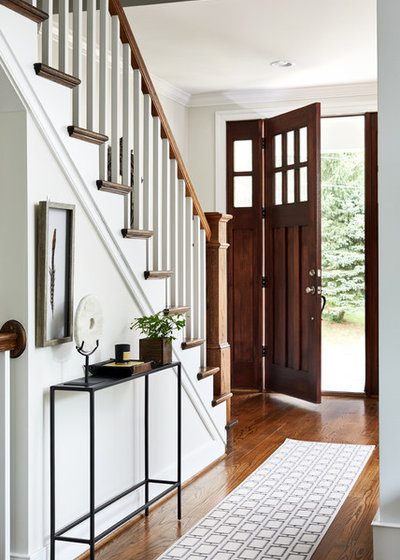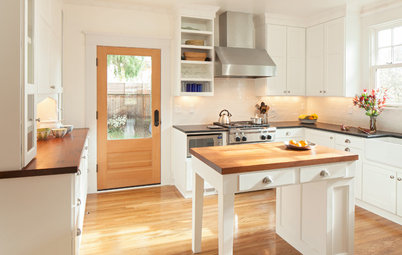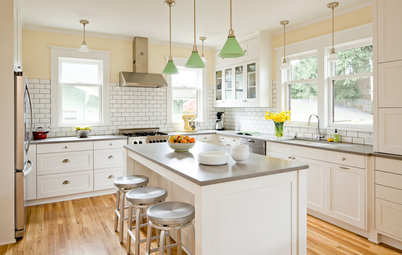Fix It or Not? What to Ask When Prepping Your Home for Sale
Find out whether a repair is worth making before you put your house on the market
Laura Gaskill
May 19, 2019
Houzz Contributor. I cover decorating ideas, Houzz tours & the monthly home maintenance checklist. My favorite pieces to write center around the emotional aspects of home and savoring life's simple pleasures. Get my bi-weekly email: https://www.lauragaskill.com/thesimplelist/
Houzz Contributor. I cover decorating ideas, Houzz tours & the monthly home maintenance... More
When you make the decision to sell your home, it can be tricky to know which changes would make your home sell more quickly or boost the sale price — and which would be a waste of your time and resources. Each home (and each homeowner) is different; that’s why we’ve come up with eight key questions to ask yourself before making any changes to prep your home for sale.
General Questions
These first three questions will help you take the temperature of the real estate market in your area and assess the competition.
1. How hot or cold is the market in your area? Are homes being snapped up after the first open house, or are they languishing on the market for months? Are homes being sold at or near the asking price, or for much lower? Are open houses bustling with people, or is attendance sparse? Get a feel for the market in your area by talking with your real estate agent and checking local listings. If it’s a seller’s market, you may be able to get away with doing fewer repairs and modifications before selling, and still have good results — in a buyer’s market, expect to do more work to make a positive impression on buyers.
These first three questions will help you take the temperature of the real estate market in your area and assess the competition.
1. How hot or cold is the market in your area? Are homes being snapped up after the first open house, or are they languishing on the market for months? Are homes being sold at or near the asking price, or for much lower? Are open houses bustling with people, or is attendance sparse? Get a feel for the market in your area by talking with your real estate agent and checking local listings. If it’s a seller’s market, you may be able to get away with doing fewer repairs and modifications before selling, and still have good results — in a buyer’s market, expect to do more work to make a positive impression on buyers.
2. How fast are you looking to sell? If you need to sell your home immediately — say, because you have already committed to buying another home or need to move because of work — it is in your best interest to do everything in your power to ensure a quick sale at the highest price possible. If you have more flexibility, and you feel uncomfortable making too many pricey changes to your home before selling, it may make more sense to focus on cleaning, decluttering and making small cosmetic changes (like painting) — particularly if the market is hot and favors the seller. If you aren’t getting the offers you would like, you can always decide to spring for a few bigger changes later and relist your home.
Find a reliable painter in your area
Find a reliable painter in your area
3. What is the condition of comparable homes on the market? It can be quite helpful to know a little about the homes that buyers in your area are looking at. Examine photos of homes for sale in your area or even attend a few open houses, and make a mental note of how the other homes compare to yours. Are the kitchens updated? Are the floors in good shape? If all of the other homes you see have a certain feature (for instance, an updated kitchen) that yours lacks, consider making that a priority. You don’t need to make your home exactly like all the other homes on the market; just make sure there isn’t a single factor that could give your home a disadvantage.
Consult a local kitchen designer to see what you can update quickly
Consult a local kitchen designer to see what you can update quickly
To Fix or Not to Fix: Deciding Which Repairs Are Worth Tackling
The next five questions will help you assess whether or not to make a specific repair or change before selling your home.
4. Does the faulty item give the impression the property has not been well cared for?Leaky faucets, cracked tiles, an overgrown lawn, broken appliances or anything else that doesn’t work as it should can immediately turn off buyers. At an open house, people often zip through quite quickly, and if they notice one or two things that send up red flags, they may not give your home another chance.
Shop for a new toilet on Houzz
The next five questions will help you assess whether or not to make a specific repair or change before selling your home.
4. Does the faulty item give the impression the property has not been well cared for?Leaky faucets, cracked tiles, an overgrown lawn, broken appliances or anything else that doesn’t work as it should can immediately turn off buyers. At an open house, people often zip through quite quickly, and if they notice one or two things that send up red flags, they may not give your home another chance.
Shop for a new toilet on Houzz
5. Can you find a less expensive fix? Let’s say you scoped out the comparable homes on the market in your neighborhood, and they all have updated kitchens but yours hasn’t been touched for some time. Rather than spend big on a full kitchen remodel, why not give your kitchen a less costly refresh? For instance, you could paint the cabinets, swap out cabinet hardware, change the light fixtures and upgrade the appliances to something current and functional but not top-of-the-line. You will put some money into it but not nearly as much as with a full remodel — well worth it if it gets your home in the running in a competitive market.
6. How much will you realistically need to lower the price if you don’t fix it? If you have a lot of costly repairs to tackle to get your home ready to sell, you may be considering selling it as is. But keep in mind that buyers looking for a fixer-upper will also be looking to discount the selling price for the repairs plus the hassle. In other words, you won’t be able to simply estimate how much the repairs will cost and deduct that from the selling price; you’ll need to deduct even more to make it worth the buyer’s time and effort. Discuss this with your Realtor and look into other fixer-uppers for sale in your area to come up with an appropriate selling price.
7. Is it one of the first things potential buyers will see? First impressions are key, and that is never more true than in the real estate business! If you have a repair you are unsure about tackling, use this as a litmus test: Is it something the buyer will see as he or she approaches your house and walks through the front door? If so, fix it.
Hire a home improvement professional to tackle repairs
Hire a home improvement professional to tackle repairs
8. Could it be a deal breaker? Some home repairs, like a new roof, are just so major that they will scare off all but the most determined buyers. If the market in your area is hot (see No. 1) and you have ample time (see No. 2), there’s no harm in trying to sell without making the big repair, as long as you are willing to price it accordingly (see No. 6). If it’s a buyer’s market but you don’t have time to make the repair before listing, you could offer to pay for it as part of the sales agreement — otherwise it’s probably best to make the change first and then put your home on the market.
Tell us: Are you selling or have you recently sold your home? What has worked or not worked for you? Share your experiences in the Comments.
More on Houzz
10 Low-Cost Tweaks to Help Your Home Sell
Find a general contractor to help with your project
Shop for home improvement products
Tell us: Are you selling or have you recently sold your home? What has worked or not worked for you? Share your experiences in the Comments.
More on Houzz
10 Low-Cost Tweaks to Help Your Home Sell
Find a general contractor to help with your project
Shop for home improvement products
Related Stories
Area Rugs
Up to 80% Off Rugs in Cool Hues
By Houzz
Calming colors to bring balance to your space
See Products
Most Popular
How to Stage Your Kitchen for a Home Sale
Attract buyers with a kitchen that’s clean, bright and welcoming — no expensive overhaul required
Full Story
Most Popular
10 Low-Cost Tweaks to Help Your Home Sell
Put these inexpensive but invaluable fixes on your to-do list before you put your home on the market
Full Story
Most Popular
Your Home-Selling Guide for a Faster and Better Sale
Learn staging and curb appeal tricks, how to get the best photos and more in this roundup focusing on high-impact house-selling strategies
Full Story
Entryways
10 Ways to Dress Up the Stoop
Create entryway appeal even in a pint-size area by decorating with plants, paint, rugs and more
Full Story
Life
15 Questions to Ask When Interviewing a Real Estate Agent
Here’s what you should find out before selecting an agent to sell your home
Full Story
Bar Stools & Counter Stools
Your Favorite Furniture Under $199 With Free Shipping
By Houzz
Find something stylish for every room
See Products
Bar Stools & Counter Stools
Up to 55% Off Swivel Bar Stools With Free Shipping
By Houzz
Elevate your design with these head-turning seats
See Products
Moving
The All-in-One-Place Guide to Selling Your Home and Moving
Stay organized with this advice on what to do when you change homes
Full Story
Most Popular
7 Must-Dos on the Day You Show Your House
Don’t risk losing buyers because of little things you overlook. Check these off your list before you open the front door
Full Story

























































We just recently sold a 2600 sq ft home built in 2007 to downsize. We finished the basement prior to putting it on the market as we thought it would bring in the price point we we thought we could get based on comps. Basement remodel cost about 8K (we did it all ourselves) and sold the home at a much lower price point than had expected. The basement was already partially finished with 3 separate rooms and a storage closet and we believe the house would have sold for the same amount if we hadn't completed the remodel. Storage galore, drywall, flooring, painted ceiling, classic painted steps leading to the 1st floor, etc.
We were house/land hunting last week and I would buy a dated, unfixed house in a great area in a second if it were priced accordingly. I would rather renovate according to my style than live with something I dislike but is too new to rip out. It’s kind of like there are no bad houses, just bad prices.
We bought our house in Phoenix Metro area with a gorgeous, totally finished 9 foot ceiling basement with huge windows. Where else to have a basement whose temp is much lower than main floor. But, comps were very difficult to acquire. Not sure about other locations or states, but, in Phoenix, AZ area, we discovered that basement square footage is evaluated at lower price than main floor and upper floors?? We learned that this is an important fact to check before renovation to sell or to purchase!!